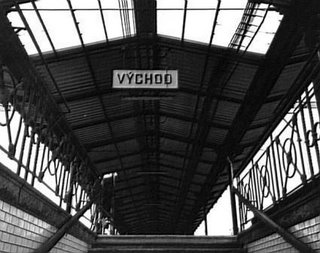No More Heroes

My new room is not quite the bargain it first seemed; my window overlooks a busy road junction outside the Palyvaudvar, and the traffic noise is staggering. I eat in the hotel's Ettrem. The waitress cum barmaid is rude and resents my distracting her from her crossword puzzle, and my order is met with a firm it is not possible. I convince her that I will not leave until she takes my order and I have eaten exactly what I have chosen; she admits defeat with a desolutory "ok" and I eat an inexpensive and acceptable Paprika stew with rice. The ashtray she provides is a dirty saucer, there is a group of jobbing Romanian builders conducting a small riot in the corner, and the jukebox is playing a Bryan Adams song with his vocals removed and replaced with a wailing Hungarian woman. However, it is warm.
In the morning I order an espresso from the surly waitress, which sets her face as hard as concrete. I dare not risk provoking her further with a request for food, and keep this in reserve in case I need to eat here tonight. I walk over to the station and buy another coffee at the Hot-Dogey-Burgery booth on the platform and survey the fallout from last night's shunting: a box car with broken buffers leans in the ballast at the end of a rake of container wagons - it must have hit them at some speed to derail itself. I buy a ticket for Fuzesabony - for no other reason than it's curious and entertaining name - and take a seat in the lead coach behind the M41 diesel. As I get on, I notice the Ganz-Budapest builder's plate behind it's cab door; it was built in 1977, it's engine being bolted together and it's bodywork welded as I was riding around on what was then British Rail. I used to spend a lot of Saturdays at Peterborough station - who would think of doing such a thing now? - watching Deltic diesels on the East Coast Mainline. Light, fast, and powerful, their name derived from the delta shape of their engines, which had originally been developed to power Second World War torpedo boats. The triangular, two-stroke engines had a unique sound - part Spitfire, part cow mooing in labour. They disappeared from BR in the early 1980s, along with a dozen other types of diesel, some to be preserved, most to be scrapped, all of them missed. The nicknames around these diesels reflected the times: Rats, Skinheads, Growlers, Slim Jims, all tearing up the tracks to the sound of The Sex Pistols, The Clash, and The Jam. The Deltics carried the names of racehorses - Alycidon, Nimbus - and regiments - The Black Watch, Royal Highland Fusilier, while the Peaks bore the names of mountains like Great Gable and Scaffel Pike. The class 45s carried on the military theme with names like 3rd Carabiner and Royal Ordnance Corps, while the class 40s took the names of Merchant Navy vessels; Aquitania was one of my personal favourites, and a preserved example was named Atlantic Conveyor after the ship was lost during the Falklands conflict. The Warship class diesels plied the rails with names like Benbow, Onslaught, Greyhound, and Dreadnought; all 72 of the Western class used their official nickname as a prefix - Western Lady, Western Patriot, Western Enterprise - and real tears were shed by their drivers when these engines were scrapped. The smaller engines remained anonymous and largely ignored until mass scrapping started in the run-up to privatisation, by which time it was too late. By the late 1980s most of the Rats and Peaks had gone, and all of the Warships and Westerns were consigned to history. Identical Intercity 125s took their places, and British Railways was never the same again, never as interesting and diverse.
As I sit on the platform at Fuzebody an M41 drifts through the station with two wagons of sawn timber; an M62 arrives from the fuelling point and couples onto a mixed freight that the M63 shunter has put together. Over the border, goggle-eyed 754 diesels and frowning 749s are everywhere, as are the smaller class 742s, and it is not unusual to see a Russian TEM2. None of them carry names, but that doesn't matter: they are real trains, characteristic and idiosyncratic.
I catch the late afternoon train back to Debrecen and drink a Kozel in the Bufe, listening to the crashes and clangs of another night's shunting over the jukebox playing Making Your Mind Up by Brotherhood Of Man - quite why this should be a selection in a station bar in Eastern Hungary is beyond reasonable logic, but I can't say it surprises me. The Hag Of The Etterem is hunched over her crossword when I poke my head round the door, but I really can't face her tonight and sneak back to my room. I wash and change and walk across the park to a little bistro called Kino; I sit at table in the corner with a plate of pasta and study the film posters and photographs that decorate the walls - John Wayne, Charlton Heston, Marlon Brando. Perhaps there really are no more heroes anymore.

0 Comments:
Post a Comment
<< Home